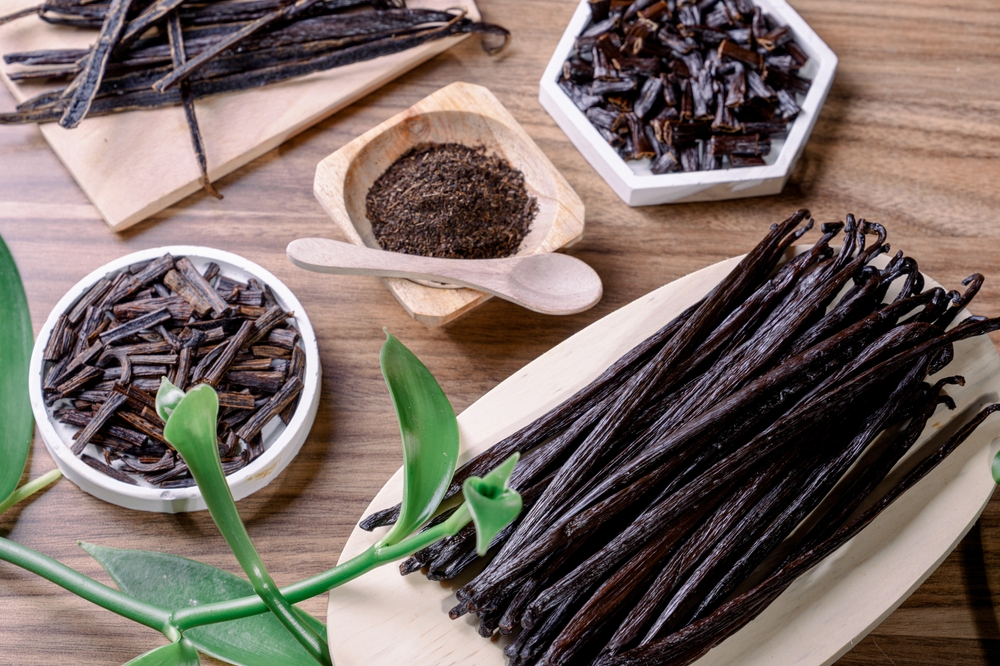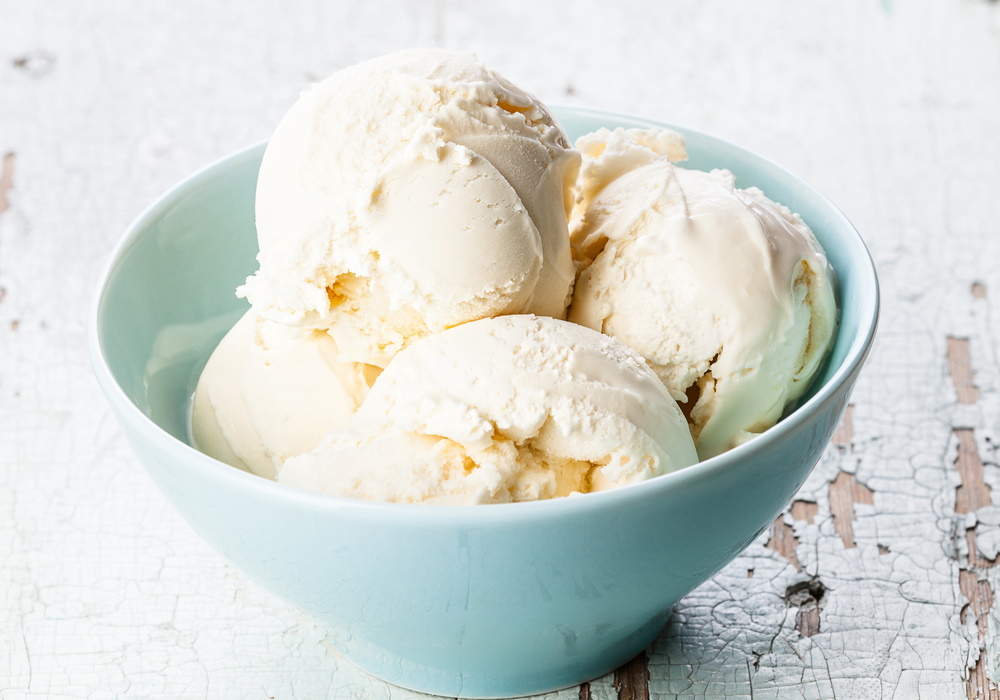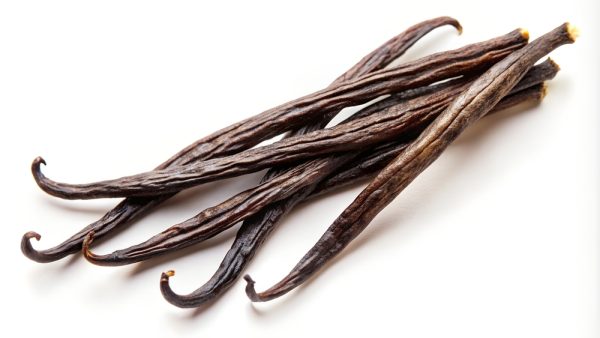Click to Skip Ahead
Vanilla is a common additive that is used to flavor sweet treats like cake, biscuits, and ice cream. Although some people keep and use the pods in their culinary efforts, most homes have vanilla extract, which is made by combining mashed vanilla pods with alcohol. Essences and concentrates have high concentrations of alcohol, which means they are not safe for dogs to consume. Even a relatively small amount of alcohol can make your dog very ill.
However, the natural vanilla pods and beans are not toxic for dogs and shouldn’t cause any ill effects. If the extract has been cooked, this should get rid of much of the alcohol content. That and the relatively small amount of vanilla extract used in the first place means if your dog consumes vanilla cake or another product that has been baked or cooked, they should be safe, at least as far as the vanilla is concerned.
Can Dogs Eat Vanilla?
Vanilla in the home can take several forms. The pods of pure vanilla have been dried over several months before they go dark brown and can be used in cooking. Vanilla itself is not toxic to dogs and your dog should be fine if they have eaten a bite of the pods or the seeds inside. They are concentrated and high in sugar, so may be a little rich for your dog which can cause an upset stomach, but there shouldn’t be any long-term negative effects.
Pure vanilla can be very expensive, so a lot of home bakers have vanilla extract instead. To make extract, vanilla pods and seeds are mashed and mixed with alcohol before being left. Some extracts have an alcohol content as high as 30%. While the vanilla itself will not cause any problems, alcohol can be very dangerous for dogs and its consumption can cause alcohol poisoning. As such, you should ensure your dog does not consume vanilla essence.
Vanilla is also commonly found in other food items and treats. Whether they are safe or healthy for your dog will depend on the product in question, and especially the additional ingredients that are found in the food.

Are There Any Benefits of Feeding Vanilla to Dogs?
There are no real nutritional benefits for dogs—when coupled with the high sugar and potential for vomiting and diarrhea with pure vanilla, it is probably best to avoid giving this tasty but expensive treat to your pup. There are certainly better alternatives for tasty treats to feed.
Avoid Extracts
The beans and pods of vanilla are not toxic and you can offer a bite to your dog, although this ingredient is best avoided as it contains concentrated sugar and may upset your dog’s stomach. However, extracts have high alcohol content, and while the vanilla itself is not toxic to dogs, alcohol is.
Considering some extracts can have 30% or higher alcohol levels, vanilla extracts are potentially dangerous for dogs. Ensure you keep your bottles of vanilla extract away from your dog.
Alcohol Poisoning In Dogs
Although a quick lick of a drop of vanilla extract is unlikely to cause ill effects on your dog, smaller dogs and larger volumes of extract can lead to alcohol poisoning.
Alcohol poisoning is serious. Signs of poisoning include vomiting, excessive drinking and urination, poor coordination and disorientation, and depression. Serious signs to look for, which can indicate that the poisoning has progressed include tremors. Worst-case scenarios include seizures, collapse, coma, and death.
If you believe your dog has consumed alcohol, including from vanilla extract, consult a vet straight away. They will discuss the risks with you based on your pup’s circumstances, and they will advise on the best course of action. They will let you know whether you need to take the dog in for treatment or whether you can monitor things at home. But, if you keep your dog at home, and the situation worsens, contact the vet again.
If your dog does have to go to the vet, they may induce vomiting or hospitalize your dog for a drip to prevent dehydration, further treatment, and monitoring.

What Are Some Alternatives?
It is good to treat your dog occasionally, and most pups love to get involved in eating the food you’re enjoying. Avoid giving vanilla extract, and consider alternatives to pure vanilla, including the following human foods that are healthy as an occasional treat:
- Peanut Butter – Peanut butter is fatty but as an occasional treat, your dog will love it. It’s sticky, can be crunchy, and it is a great way to keep biscuits and other treats inside a Kong. Ensure you buy unsweetened peanut butter, and especially avoid peanut butter products that contain xylitol sweetener, which is highly toxic to dogs.
- Watermelon – Watermelon contains natural sugars but can make a tasty treat when fed in moderation. You can offer the fruit to your dog but avoid the rind as it is mostly undigestible fiber. It makes an especially good treat on a hot summer’s day because of the high moisture content. It will help keep your dog rehydrated, while also giving them enjoyable food.
- Carrots – Carrots are crunchy, low in calories, and packed with vitamins and minerals. Although some dogs will turn their noses up at the bright orange treat, others love pieces of carrot.
- Greek Yogurt – Live yogurt is especially beneficial to your dog because of its probiotic properties. Probiotics are good bacteria that help promote good gut health by keeping bad bacteria at bay. The tangy flavor of yogurt might not appeal to all dogs, but you can put a dollop on your dog’s kibble or freeze it as a summertime treat. Choose unflavored, unsweetened Greek yogurt, and avoid this treat if your dog is sensitive to lactose. While this yogurt is lower in lactose than other dairy products, some dogs might not tolerate it.
- Apple – Apple is a sweet fruit that should be fed in moderation. And, while the flesh of the apple is perfectly safe for dogs to consume, you should peel it and not feed the core or pips, which release cyanide when chewed. While the amount is low enough that it won’t affect humans, dogs are smaller and therefore more sensitive to the substance.

Can Dogs Eat Vanilla Ice Cream or Yoghurt?
Vanilla ice cream or yogurt typically won’t have a high alcohol content which means the vanilla is safe. However, there products typically contain a lot of sugar as well as dairy products. Lots of dogs are lactose intolerant, so dairy ice cream can cause diarrhea and other stomach problems.
The calories in vanilla ice cream and yogurt can lead to unhealthy weight gain over time. If you want to feed a blob, keep it as a rare treat in dogs that can cope with lactose, once you have made sure it is free of toxic ingredients. Better yet, choose a dog-friendly version of this snack.
If you are unsure, we recommend seeking veterinary advice and guidance before offering anything new to your pet.

If you need to speak with a vet but can’t get to one, head over to PangoVet. It’s an online service where you can talk to a vet online and get the personalized advice you need for your pet — all at an affordable price!
Conclusion
Vanilla pods and seeds are non-toxic but unhealthy ingredients for dogs, so if your dog has consumed a little pure vanilla at home, you shouldn’t notice any ill effects other than possible stomach upset. However, vanilla extract is a different story. It is made using alcohol, and some extracts can contain as much as 30% alcohol: enough to cause alcohol poisoning if your dog consumes enough of it.
While a lick of a small drop shouldn’t cause any adverse reactions, you should watch for signs of alcohol poisoning if your dog has consumed any vanilla extract.
Featured Image Credit: ketopfrag, Shutterstock













